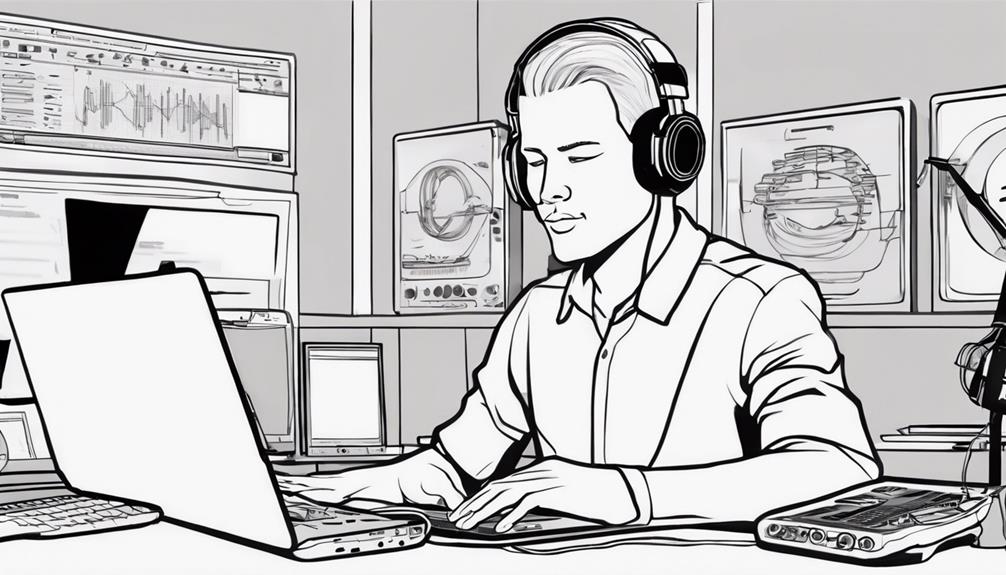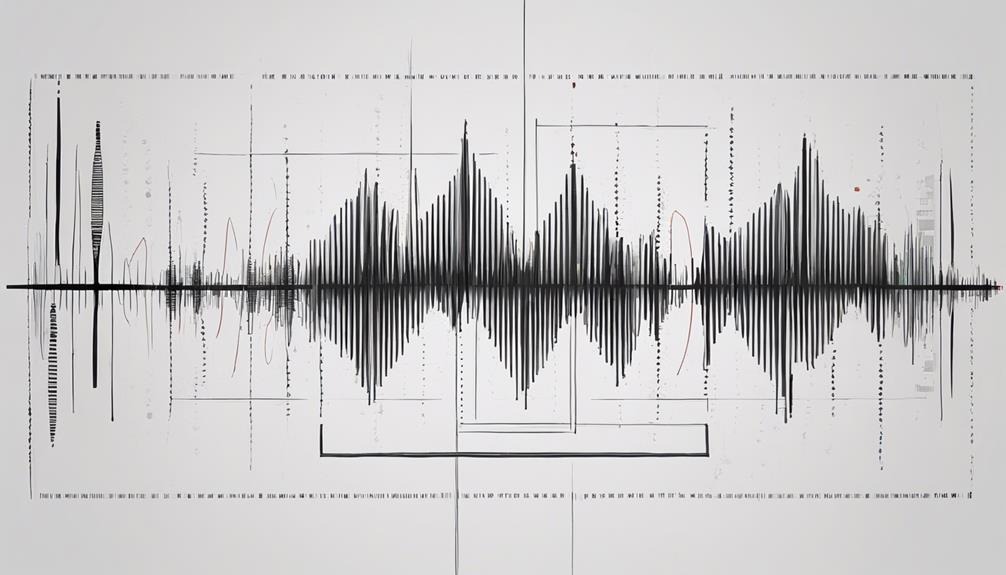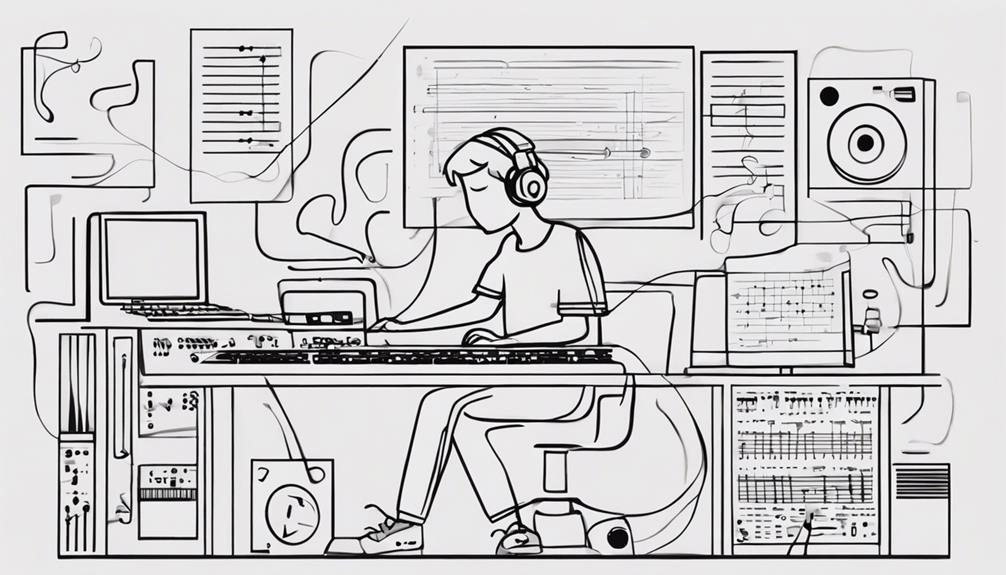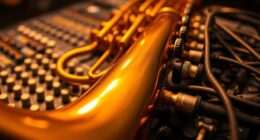When selecting headphones for music production, prioritize sound quality. Opt for studio headphones with a flat frequency response and extended range for nuanced details. Guarantee accuracy by choosing closed-back for recording, open-back for natural sound, or hybrid for versatility. Explore top brands like Shure or Sennheiser for quality and precision. Comfort and impedance are important for long sessions. Frequency response and noise isolation techniques enhance your final mix. Select the right type of headphones based on your task, whether it's tracking, mixing, or on-stage monitoring. Giving priority to these factors leads to a professional outcome.
Key Takeaways
- Prioritize flat frequency response for accurate sound reproduction.
- Consider closed-back for noise isolation in recording, open-back for natural sound.
- Choose reputable brands like Shure or Sennheiser for quality.
- Select based on workflow: closed-back for tracking, open-back for mixing.
- Look for extended frequency range and comfort for prolonged use.
Sound Quality Considerations
When selecting headphones for music production, prioritize sound quality above all else. Opt for studio headphones that offer a flat frequency response, ensuring a neutral audio representation without any coloration. This accuracy in sound reproduction is essential for capturing every detail in the mix with precision.
Look for headphones with an extended frequency range to capture subtle nuances in the music that might get lost with lower-quality options.
Superior sound quality in studio headphones is vital for achieving professional results in recording, mixing, and mastering tracks. The clarity and accuracy provided by high-quality headphones can make a significant difference in the final output of your music production.
Flat Frequency Response Importance
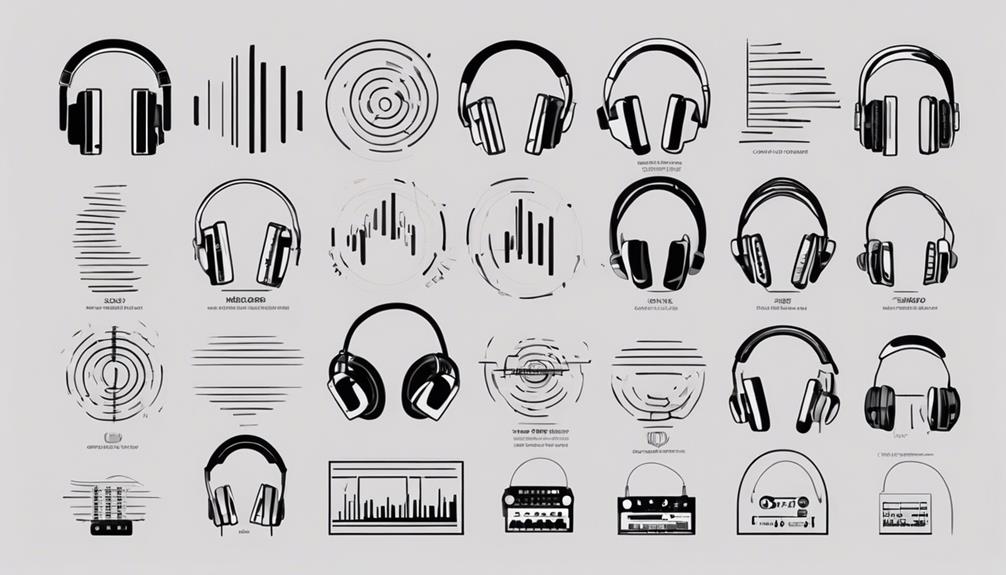
When selecting headphones for music production, recognizing the significance of flat frequency response is vital. This feature guarantees that the sound you hear accurately mirrors the original recording, aiding in identifying and fixing any mix issues.
Studio headphones with a flat frequency response provide a neutral sound profile, essential for achieving a balanced and professional final mix.
Frequency Response Basics
Having a clear understanding of the importance of flat frequency response is essential when selecting headphones for music production. In music production, the frequency response of headphones plays a critical role in achieving accurate audio reproduction.
Studio headphones with a flat frequency response are designed to deliver a balanced mix by ensuring that all frequencies are reproduced equally without any emphasis or attenuation on specific ranges. This feature is particularly important for professionals engaged in mixing and mastering, as it allows them to identify and address any imperfections in the sound accurately.
Professional-grade headphones with flat frequency response provide a true representation of the recorded audio, enabling producers and engineers to make informed decisions during the production process. When choosing headphones for music production, prioritizing models that offer a flat frequency response can greatly enhance the quality and precision of your work.
Neutral Sound Characteristics
Selecting headphones with neutral sound characteristics, especially a flat frequency response, is essential for achieving accurate audio reproduction in music production. Studio headphones with a flat frequency response guarantee that the sound you hear is faithful to the original recording, without artificially boosting or reducing certain frequencies.
This balanced sound is vital for making informed mixing decisions, as it allows you to hear all elements of the music accurately. By using headphones with a flat response, you can pick up on subtle details and nuances within the music that might otherwise be masked by headphones with colored sound profiles.
The transparent and uncolored sound provided by headphones with a flat frequency response enables precise monitoring during the mixing process, helping you create a well-balanced final product that accurately reflects your artistic vision. Make sure to prioritize the accuracy of your headphones' frequency response when selecting equipment for music production.
Studio Monitoring Consideration
Ensuring studio monitoring equipment maintains a flat frequency response is vital for accurate audio representation in music production.
When choosing studio headphones, prioritize models that offer a flat frequency response to guarantee that all frequencies are reproduced equally without any added coloration. This feature is essential for professionals as it allows them to hear every detail in the mix without bias towards specific frequencies.
With headphones providing a flat frequency response, imperfections in the mix can be easily identified and corrected, leading to a more precise final product.
Professional studio monitors and headphones are specifically designed to have a flat frequency response, making them ideal for monitoring and mixing tasks where accuracy is paramount.
Closed-Back Vs Open-Back Designs
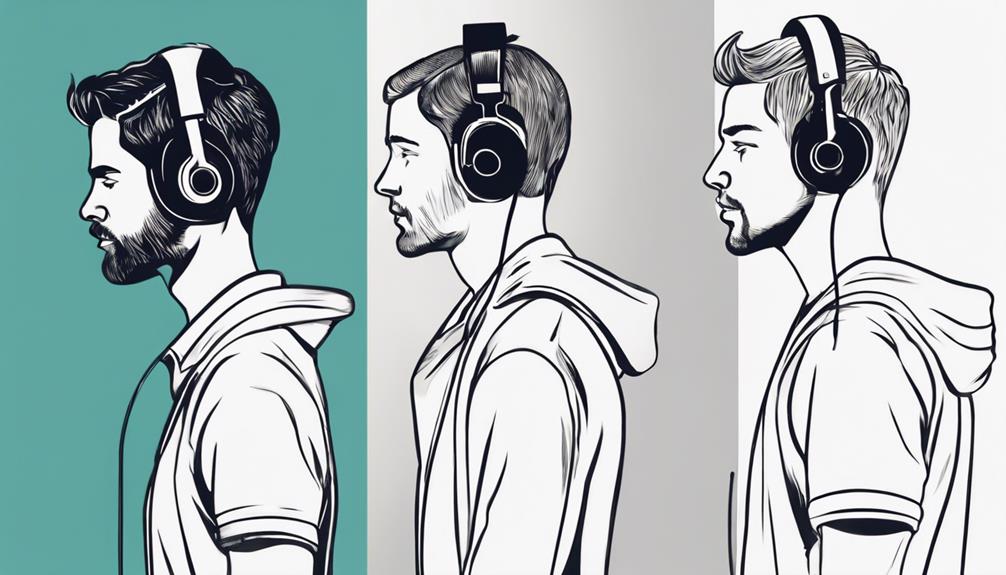
Which design – closed-back or open-back – best suits your needs when choosing headphones for music production?
Closed-back headphones excel in noise isolation, making them ideal for recording sessions where external sounds need to be blocked out. They're perfect for tracking and initial recording stages to prevent sound leakage, ensuring a clean audio signal.
On the other hand, open-back headphones provide a more natural sound experience with a spacious soundstage, making them preferred for tasks like mixing and mastering. Their transparent sound quality is well-suited for critical listening and detailed audio editing, allowing for precise adjustments.
Some headphones, like the versatile SRH840A, offer a design that caters to both tracking and mixing tasks, providing flexibility for various production needs.
When deciding between closed-back and open-back designs, consider the specific requirements of your music production workflow to choose the option that best enhances your recording and editing processes.
Top Recommended Brands
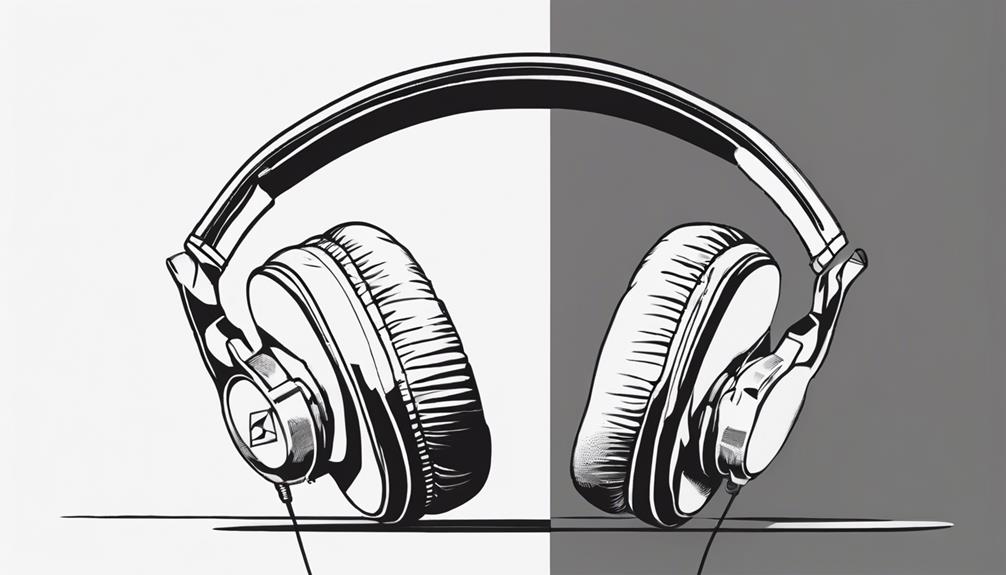
When considering top recommended brands for studio headphones in music production, Shure, Sennheiser, Audio-Technica, AKG, Beyerdynamic, and Steven Slate stand out as industry favorites known for their quality and accuracy in sound reproduction. These brands have earned their reputation for being reliable choices among audio professionals due to their commitment to delivering high-quality, durable headphones tailored for the demands of music production.
Whether you're a producer, engineer, or musician, each of these brands offers a diverse range of studio headphones designed to meet your specific needs. Steven Slate also deserves a mention for its excellent studio headphones designed to elevate your music production and mixing experience.
Trusted for their performance and precision in audio reproduction, these top brands make sure that you get the most out of your studio sessions when it comes to monitoring and producing music.
Studio Headphones for Precision

For achieving precision in music production, professional studio headphones play an essential role by accurately capturing all elements of the mix. These headphones are designed to help you detect subtle nuances and imperfections that might be overlooked with regular consumer headphones. With extended frequency responses, professional studio headphones guarantee that every note is heard clearly, allowing you to make informed mixing decisions. Additionally, the isolation provided by studio headphones shields you from external sounds, enabling you to focus solely on monitoring the recorded audio without distractions. It's worth noting that top producers rely heavily on studio headphones to deliver a polished and professional final mix.
| Feature | Description |
|---|---|
| Frequency Response | Extended frequency range for precise audio reproduction. |
| Isolation | Blocks out external noises, providing a focused monitoring environment. |
| Professional | Designed for professionals in the music industry who require accuracy and reliability. |
Comfort and Durability Factors

Guaranteeing comfort and durability in your studio headphones is essential for extended music production sessions. When considering which headphones to invest in, here are some key factors to keep in mind:
- Extended Wear Comfort: Opt for headphones with plush earpad materials and adjustable headbands to prevent discomfort during long hours of use.
- Open-Back Design: Choose open-back headphones for better airflow, reducing ear fatigue during extended wear compared to closed-back models.
- Durability: Look for headphones built with quality materials and sturdy construction to ensure they can withstand frequent use and potential wear and tear.
- Noise Isolation: If you work in a noisy environment, closed-back headphones provide better noise isolation, making them ideal for tracking and recording sessions.
Impedance and Sensitivity Insights
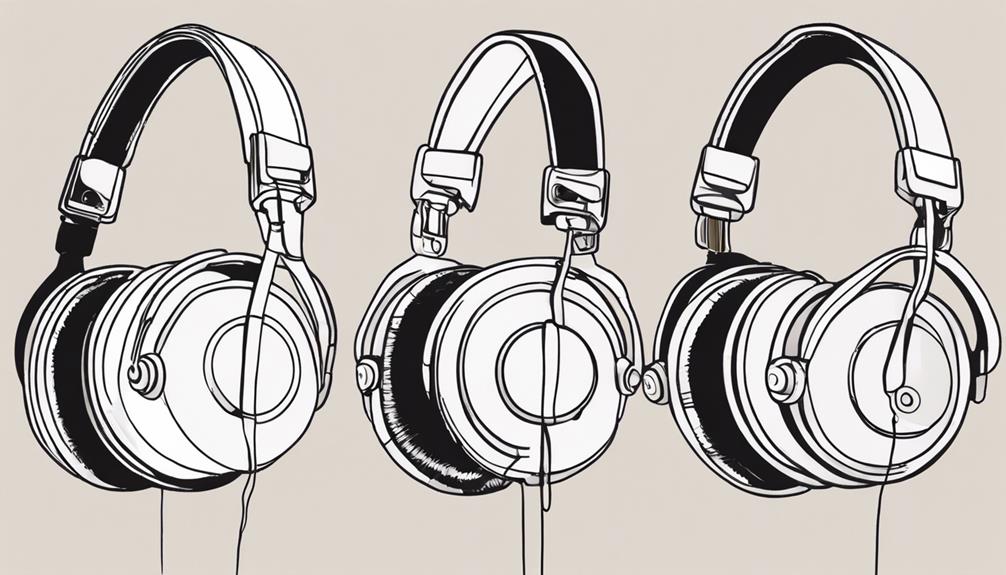
To optimize your music production setup, understanding the impedance and sensitivity of headphones is essential for achieving the desired audio quality and performance.
Headphone impedance measures the electrical resistance, with high-impedance headphones requiring a dedicated amplifier for best performance. Impedance affects volume adjustment, influencing how well headphones can be driven by different devices.
On the other hand, sensitivity in headphones indicates the loudness at a given power level, typically measured in decibels. High-sensitivity headphones can produce louder sound levels with less power input, making them suitable for certain audio equipment setups.
It's important to grasp the relationship between impedance and sensitivity to select headphones that not only match your audio equipment but also cater to your listening preferences. By considering these factors, you can ensure that your headphones deliver the best sound quality and performance for your music production needs.
Understanding Frequency Response
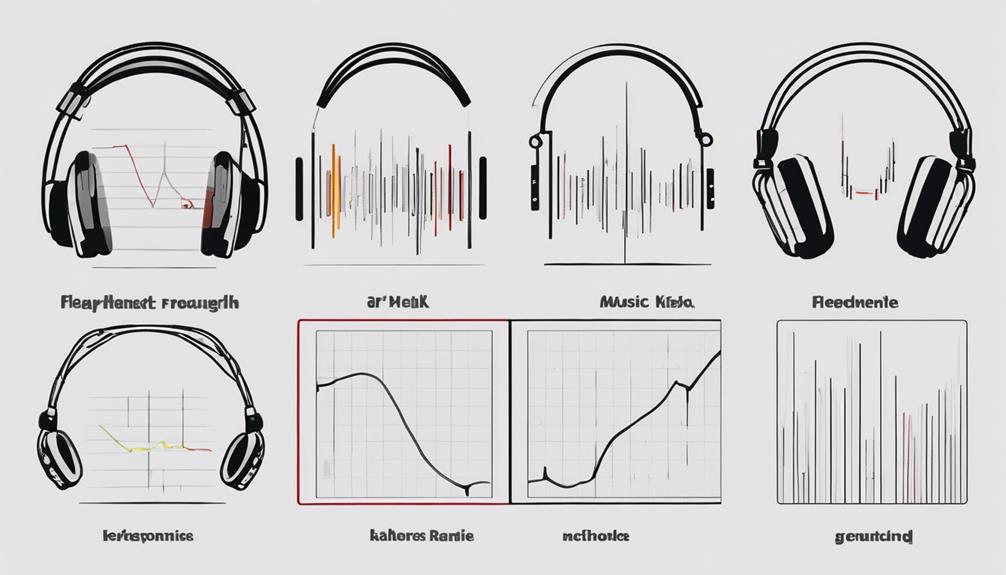
Professional studio headphones' extended frequency response plays a pivotal role in capturing all nuances in music beyond the standard 20 – 20,000 Hz range. When it comes to music production, understanding frequency response is vital for achieving accurate and detailed sound reproduction. Here's what you need to know:
- Extended Frequency Response: Studio headphones offer a broader frequency range, allowing you to hear low bass tones and high-frequency details with clarity.
- Accurate Frequency Reproduction: These headphones make sure that transient details, like drum hits or guitar plucks, are faithfully reproduced, aiding in precise music production.
- Nuances in Music: The extended frequency response helps in capturing subtle nuances such as vocal inflections and instrument overtones, enhancing the overall listening experience.
- Final Audio Output: By providing an accurate representation of the entire frequency spectrum, studio headphones contribute to a well-balanced and dynamic final mix for your music production projects.
Understanding frequency response in studio headphones is essential for achieving a polished and professional audio output in your music productions.
Noise Isolation Techniques
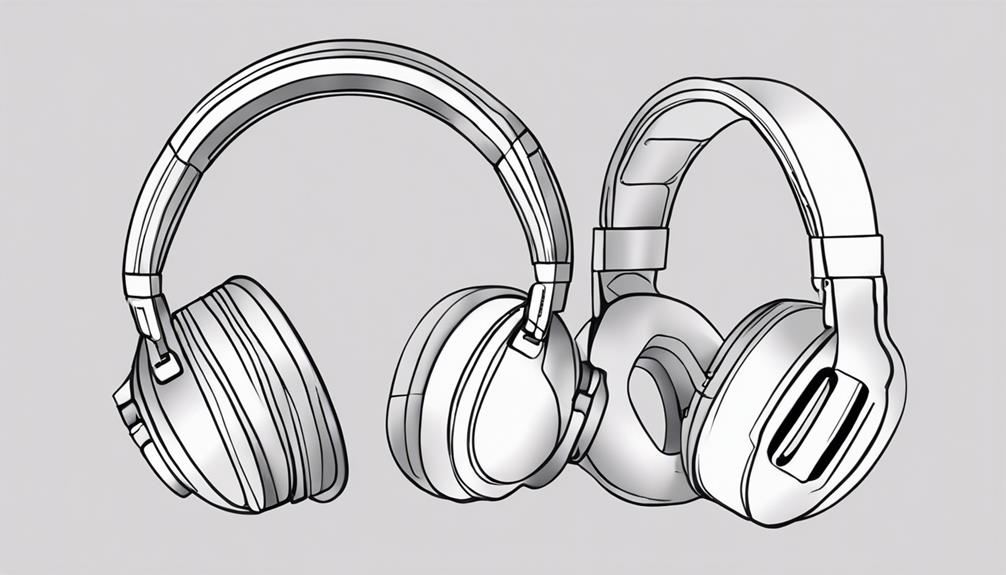
When selecting headphones for music production, consider the essential aspect of noise isolation techniques. These techniques help block out external sounds, allowing you to focus on the accuracy of your music.
Opting for headphones with soundproofing features and a closed-back design can greatly benefit your overall listening experience.
Soundproofing for Accuracy
Implement noise isolation techniques in headphones to guarantee accurate music production by eliminating external sounds and focusing solely on the recorded audio. By utilizing soundproofing techniques, you can make sure that distractions are minimized, allowing you to hear subtle details in your mix clearly.
Here are four reasons why soundproofing is essential for accuracy in music production:
- Eliminating External Sounds: Noise isolation in headphones blocks out unwanted background noise, creating a controlled environment for precise audio monitoring.
- Enhancing Focus: Soundproofing techniques help you concentrate on the recorded audio, enabling you to make critical decisions without external interruptions.
- Preventing Distractions: Studio headphones with good noise isolation keep you immersed in your work, maintaining your creative flow during recording and mixing sessions.
- Detail-Oriented Listening: Proper soundproofing ensures that you can pick up on the nuances and intricacies within your music, leading to a more polished final product.
Closed-Back Design Benefits
Closed-back headphones offer superior noise isolation capabilities, guaranteeing a focused listening experience essential for accurate audio monitoring and recording in a recording studio. By effectively blocking external sounds, closed-back headphones create an isolated environment, vital for tracking vocals, instruments, and live recordings with precision.
The closed design of these headphones prevents sound leakage, preserving the integrity of the audio being produced. This focused listening experience enables producers and musicians to capture clean and unaltered audio during recording sessions.
When tracking vocals or monitoring intricate details in a mix, closed-back headphones excel in providing the necessary isolation for a professional studio setting. The ability to block out external noise ensures that what you hear is an accurate representation of the recorded audio, aiding in making critical production decisions.
Whether you're a seasoned producer or a budding musician, closed-back headphones are a valuable tool for achieving high-quality and reliable audio recordings in any studio environment.
Selecting the Right Type of Headphones
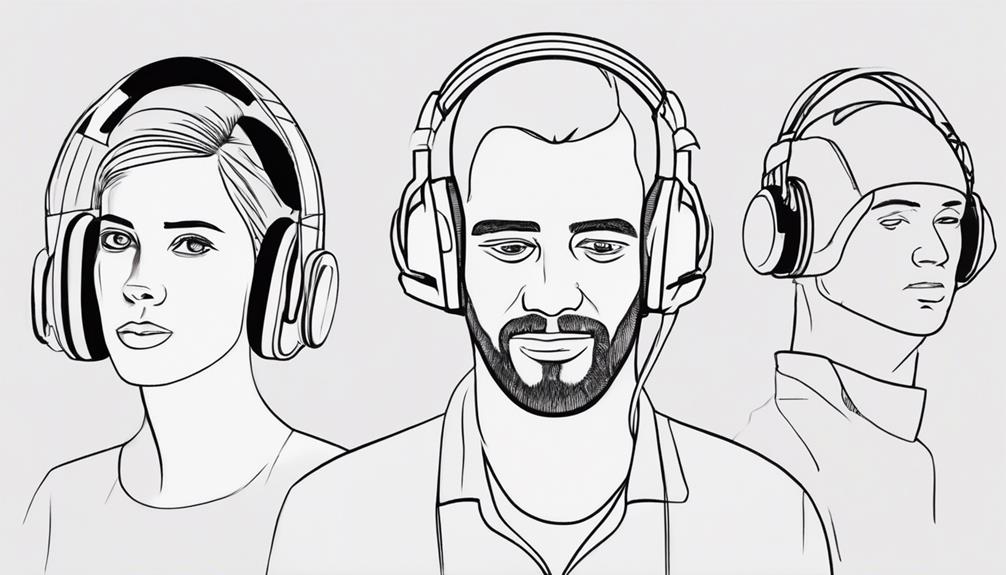
For best results in music production, make sure you choose the appropriate type of headphones that align with your specific tasks, whether it be tracking, mixing, or mastering.
When selecting headphones for music production, consider the following options:
- Closed-back headphones: Ideal for tracking due to their ability to prevent sound leakage, which is essential during recording sessions.
- Open-back headphones: Perfect for mixing and editing as they offer natural sound reproduction and a spacious soundstage for accurate audio evaluation.
- Semi-open back headphones: Provide a balance between the isolation of closed-back and the open sound of open-back headphones, making them versatile for different production stages.
- In-ear monitors: Suitable for on-stage monitoring or situations where portability and noise isolation are essential, offering a compact and efficient solution for various music production needs.
Selecting the right type of headphones based on your intended use is key to achieving professional results in music production.
Frequently Asked Questions
What Headphones Do Most Producers Use?
Most producers opt for studio-quality headphones to guarantee accurate monitoring and mixing. Popular choices like the Shure SRH840A and SRH1540 are favored. These headphones are essential for catching imperfections and nuances, allowing you to focus on the audio.
How to Choose Earphones for Music?
When choosing earphones for music, consider the snug fit for immersive sound. Different types cater to noise isolation, portability, or sound quality preferences. Look for lightweight options for on-the-go listening and compact earbuds for workouts.
Do I Need Studio Headphones for Music Production?
You need studio headphones for music production. They provide accurate sound representation, isolate external noise, and guarantee you catch imperfections. Top producers rely on them for precise monitoring. Get the best for professional results in your productions.
What Do Audiophiles Look for in Headphones?
When selecting headphones for music production, you prioritize flat frequency response, high sensitivity, low THD, and high impedance. Don't overlook comfort, durability, and build quality. These factors guarantee accurate, detailed sound reproduction for your audiophile needs.
Conclusion
Now that you have all the expert advice on choosing headphones for music production, you're ready to immerse yourself in a world of crystal-clear sound and precision.
Picture yourself in your studio, surrounded by top-quality headphones that bring your music to life with every beat and note.
With the right headphones, your music production journey will reach new heights of creativity and clarity. Whether you’re fine-tuning a mix or laying down the first tracks of a new song, high-quality headphones can make all the difference in capturing the full spectrum of sound. They allow you to hear every detail, helping you refine your craft and bring out the best in your work. As you invest in your tools and skills, don’t forget to write a business plan for music to turn your passion into a sustainable and successful career.
Get ready to elevate your sound like never before!

